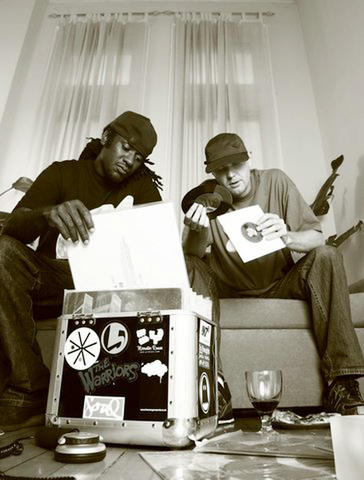Only a slip of the tongue away from an obscenity, funk sure sounds like a dirty word. "People called it funk, 'cause that's what sex smells like," says Shorty, an up-and-coming DJ with a penchant for twanging bass riffs, outrageous horns, and beefed-up drums. "When I picture funk, I think of sticky fingers and sexy chocolate love."
In the mid-1950s, Little Richard and his band were the pioneers of impregnating rock and roll with drops of funkiness. Soon Little Richard was a born again Christian and his band joined up with James Brown and the Fabulous Flames. It all went uphill from there.
While funk began more than a half a century ago, the question remains: Do today's Taiwanese club-goer really get the funk? "They're close," says Shorty. "They're starting with top 40 hip-hop and going backwards. When they get sick of hearing the same thing, it's the natural progression to go back in time and find the good stuff."

PHOTO: COURTESY OF STEREOTYPES
Catch Shorty's brand of funk at On Tap, 49, Ln 309 Guangfu S Rd, Taipei (台北市光復南路49號309 巷), every Wednesday night.
The legendary Kool DJ Herc pioneered the global phenomenon that is now hip-hop by taking two copies of the same funk records and playing the breakdowns over and over. For a dime entrance fee, people would go to 1520 Sedgwick Avenue in Brooklyn and dance all their troubles away. This past week, the city of New York recognized the birthplace of hip-hop as a historical site, essentially saving it from being torn down and the gentrification that has been happening close by. Taiwan's "Bethlehem" of hip-hop, 249 Fuxing South Road (also known as TU), will be throwing its own block party every week starting next Wednesday with hosts Stereotypes.
Stereotypes consists of two Torontonians, THAT Guy and Cap, interchanging DJ and MC duty. This combo has been putting in the work by bringing in boundary-pushing DJs for Plush, Party Room, and Room 18 and holding down a monthly residency at Genesis, Taipei's poetry slam. Stepping into the weekly game is a bit different, especially when up against the successful Liquid Lifestyle Wednesday night Fresh parties at Luxy.
"We're different because we want to bring the movers and shakers who are truly defining street culture together," THAT Guy said. "This includes street fashion designers, musicians, and dancers. We want to get music lovers out from under the rocks and connect them together.
"Funk is the cornerstone of hip-hop. It's tragic that James Brown and artists like him aren't that well known," declares Cap. "Truthfully, a lot of people outside of the expat community aren't that familiar with funk and old-school hip-hop. Hip-hop is still relatively new in Taiwan and we are taking baby steps to introduce it. At the end of the day, we are about playing good music and having fun. But we want people to understand that there is more to hip-hop than Fatman Scoop and Crooklyn Clan. We know that we have to play commercial hits to keep that dance floor moving but in the end, we are trying to keep that funk flavor alive."

May 11 to May 18 The original Taichung Railway Station was long thought to have been completely razed. Opening on May 15, 1905, the one-story wooden structure soon outgrew its purpose and was replaced in 1917 by a grandiose, Western-style station. During construction on the third-generation station in 2017, workers discovered the service pit for the original station’s locomotive depot. A year later, a small wooden building on site was determined by historians to be the first stationmaster’s office, built around 1908. With these findings, the Taichung Railway Station Cultural Park now boasts that it has

Wooden houses wedged between concrete, crumbling brick facades with roofs gaping to the sky, and tiled art deco buildings down narrow alleyways: Taichung Central District’s (中區) aging architecture reveals both the allure and reality of the old downtown. From Indigenous settlement to capital under Qing Dynasty rule through to Japanese colonization, Taichung’s Central District holds a long and layered history. The bygone beauty of its streets once earned it the nickname “Little Kyoto.” Since the late eighties, however, the shifting of economic and government centers westward signaled a gradual decline in the area’s evolving fortunes. With the regeneration of the once

The latest Formosa poll released at the end of last month shows confidence in President William Lai (賴清德) plunged 8.1 percent, while satisfaction with the Lai administration fared worse with a drop of 8.5 percent. Those lacking confidence in Lai jumped by 6 percent and dissatisfaction in his administration spiked up 6.7 percent. Confidence in Lai is still strong at 48.6 percent, compared to 43 percent lacking confidence — but this is his worst result overall since he took office. For the first time, dissatisfaction with his administration surpassed satisfaction, 47.3 to 47.1 percent. Though statistically a tie, for most

In February of this year the Taipei Times reported on the visit of Lienchiang County Commissioner Wang Chung-ming (王忠銘) of the Chinese Nationalist Party (KMT) and a delegation to a lantern festival in Fuzhou’s Mawei District in Fujian Province. “Today, Mawei and Matsu jointly marked the lantern festival,” Wang was quoted as saying, adding that both sides “being of one people,” is a cause for joy. Wang was passing around a common claim of officials of the People’s Republic of China (PRC) and the PRC’s allies and supporters in Taiwan — KMT and the Taiwan People’s Party — and elsewhere: Taiwan and